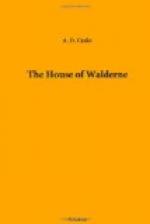Hubert had now a great claim not only on the friendship of his lord, which he had earned before, but on that of these other mighty earls, and they held a consultation together, to decide how they could best reward him for the essential service he had rendered. The earl told the whole story of his birth and education, as our readers know it.
“He has, it is true, rendered us a great service, but that does not justify us in advancing him in chivalry. He must earn that by some deed of valour, or knighthood would be a mere farce.”
“Exactly so,” said he of Hereford. “Now I have a proposition: not a week passes but my retainers are in skirmish with those wildcats, the Welsh. Let the boy go and serve under my son, Lord Walter. He will put him in the way of earning his spurs.”
“The very thing,” said Earl Simon. “Only I trust he will not get killed, which is very likely under the circumstances, in which case I really fear the poor old father would go down with sorrow to the grave. Still, what is glory without risk? Were he my own son, I should say, ‘let him go.’ Only, brother earl, caution thy noble son and heir, that the youngster is very much more likely to fail in discretion than in valour. He is one of those excitable, impulsive creatures who will, as I expect, fight like a wildcat, and show as little wisdom.”
Hubert was sent for.
“Art thou willing to leave my service?” said the earl.
“My lord,” said poor Hubert, all in a tremble, “leave thee?”
“Yes; dost thou not wish to go to the Holy Land?”
“Oh, if it is to go there. But must I not wait for knighthood?”
The reader must remember that knighthood alone would give Hubert a claim upon the assistance and hospitality of other knights and nobles, and that once a knight, he was the equal in social station of kings and princes, and could find admittance into all society. As a squire, he could only go to the Holy Land in attendance upon some one else, nor could he carry the sword and belt of the dead man whom he was to represent. A knight must personate a knight.
Hence Hubert’s words.
“It is for that purpose we have sent for thee,” replied the earl. “Thou must win thy spurs, and there is no likelihood of opportunity arising in this peaceful land (how little the earl thought what was in the near future), so thou must even go where blows are going.”
“I am ready, my lord, and willing.”
“The Earl of Hereford is about to return home, and will take thee with him to fight against the Welsh under his banner. Now what dost thou say to that?”
Hubert bent the knee to the new lord, with all that grace which he inherited from his Provencal blood. And sooth, my young readers, if you could have seen that eager face with that winning smile, and those brave bright eyes, you would have loved him, too, as the earl did; but for all that I do not think he had the sterling qualities of his friend Martin, who is rather my hero: but then I am not young now, or I might think differently.




